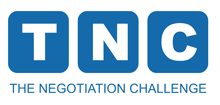The Negotiation Challenge
Script error: No such module "Draft topics".
Script error: No such module "AfC topic".
 The Negotiation Challenge is a competition for graduate students to help them hone their negotiation skills. | |
| ISIN | 🆔 |
|---|---|
| Founded 📆 | 2007 |
| Founder 👔 | Dr. Remigiusz Smolinski, Dr. Peter Kesting |
Area served 🗺️ | |
| Members | |
Number of employees | |
| 🌐 Website | [Lua error in Module:WikidataIB at line 665: attempt to index field 'wikibase' (a nil value). ] |
| 📇 Address | |
| 📞 telephone | |
The Negotiation Challenge (TNC) is an annual negotiation competition for students. Founded in 2007 by Dr. Remigiusz Smolinski and Dr. Peter Kesting, the Challenge is a joint initiative between the HHL Leipzig Graduate School of Management and the Harvard Negotiators. The competition was conceptualized to promote the benefits of negotiation pedagogy and help students systematically compare and improve their negotiation skills.[1]
The idea behind negotiation challenges such as TNC is that negotiation is a skill that can be developed through systematic training. Additionally, such contests are designed to benefit students and academia in networking and promotion of negotiation as a field of study.[2]
TNC is open to all undergraduate and graduate students, independent of their major. Teams can consist of up to three participants.
Competition Format and Evaluation[edit]
The event comprises multiple online qualification rounds where teams are handed negotiation simulations, typically involving two parties. The top 10 teams among the entrants advance to the final round with further 2-3 face-to-face negotiation rounds.
At the beginning of each round, each team receives confidential instructions for one of the parties involved in the simulation and is assigned a negotiation partner. The simulations are prepared and whetted by senior academic faculty from International Negotiation Teaching and Research Association.
Both parties involved in the negotiation have 48 hours to negotiate an agreement. The teams are evaluated on a combination of the following criteria: substantive outcome, relationship outcome and the judges’ assessment based on the Negotiation Competency model.
The teams shortlisted for the final rounds compete in front of an international jury comprising of senior negotiation scholars and practitioners.
- ↑ Smolinski, Remigiusz; Xiong, Yun (June 2020). "In Search of Master Negotiators: A Negotiation Competency Model". Negotiation Journal. 36 (3): 365–388. doi:10.1111/nejo.12332. ISSN 0748-4526.
- ↑ Shapiro, Daniel L. (January 2006). "Teaching Students How to Use Emotions as They Negotiate". Negotiation Journal. 22 (1): 105–109. doi:10.1111/j.1571-9979.2006.00088.x. ISSN 0748-4526.
This article "The Negotiation Challenge" is from Wikipedia. The list of its authors can be seen in its historical and/or the page Edithistory:The Negotiation Challenge. Articles copied from Draft Namespace on Wikipedia could be seen on the Draft Namespace of Wikipedia and not main one.
